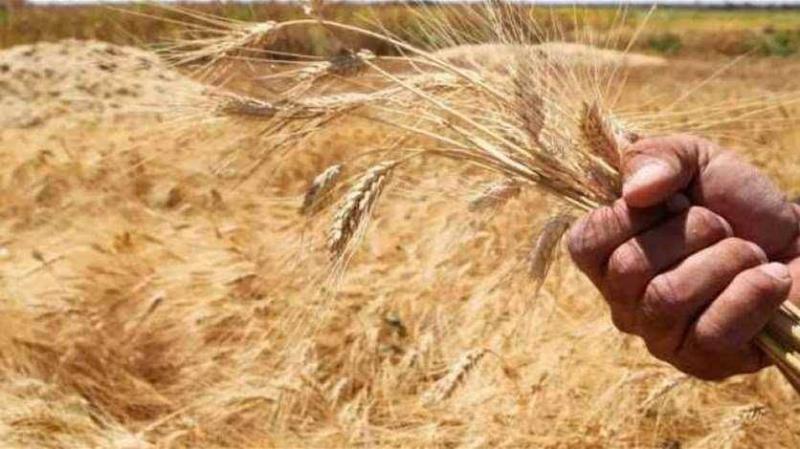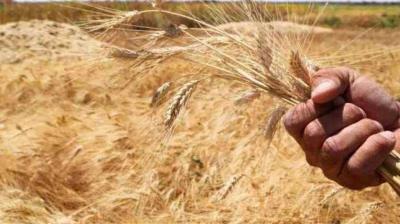On August 7, the Ministry of Agriculture announced that the Presidency of the Council of Ministers approved the purchase of locally produced wheat — including both hard and soft wheat, as well as barley — from Lebanese farmers, totaling about 40,000 tons, to be processed by local mills. This decision has been eagerly awaited, given the pressing need for greater attention to the agricultural sector amid the ongoing multifaceted crises in the country. Minister of Agriculture in the caretaker government, Dr. Abbas al-Hajj Hassan, spoke to "Nidaa Al-Watan" about this decision and other agricultural matters during a meeting in his office.
The meeting is grounded in the hope that internal crises and their external repercussions will serve as a foundation for a genuine agricultural revival that increases local production and reduces the burdens and risks associated with import deals. How will this be implemented on the ground? What are the main challenges the Ministry of Agriculture is working to overcome, including support for local agricultural and animal production, addressing water pollution, and expanding import and export market options, especially given the current stagnation with Gulf markets?
**What Wheat Are We Eating?**
To start, one must address the puzzling issue of the Ukrainian wheat shipment that failed to meet specifications, which has dominated news reports for several months without any definitive resolution regarding its fate. Al-Hajj Hassan, who has a journalistic background and describes himself as "media-oriented," points out that the Ministry of Agriculture has fulfilled its duty regarding laboratory tests. Since the ministry's responsibility ends there, leading to criminal accountability, he questioned, "Are all officials responsible for this file doing their job? There should be clarification for public opinion, and the judiciary must be held accountable if anyone has been penalized or accused."
While Al-Hajj Hassan confirmed a fine was imposed on the last shipment that was found to contain impurities and was returned to its source, we asked him about the source of wheat in the Lebanese market: "The issue is the explosion or detonation at the Port of Beirut that exacerbated the crisis. The absence of silos forced us to request many shipments and send them directly to the mills," he said.
The Ministry of Economy's warehouses and the Scientific Agricultural Research Authority are available but are not being used for storage. The reason for this is the high transportation costs from the port to the warehouses and then to mills spread across Lebanon, as Al-Hajj Hassan explained. He added, "I heard both the Ministers of Economy and Public Works and Transport discussing the construction of horizontal silos in Lebanese regions close to the mills. Personally, I support this proposal as its costs are very low and it can store wheat for six months to a year. We advocate for administrative decentralization, so economic decentralization is all the more necessary."
**Lebanese Agricultural Products**
On a related note, we touched on the divergence in the media recently between him and Minister of Economy, Amin Salam. Al-Hajj Hassan affirmed their good personal relationship but stated, "It is my duty to point out any shortcomings in work. The Minister of Economy should have purchased Lebanese wheat over two months ago, and I hope that the delay does not become the norm."
**Bringing Lebanese Production to the Forefront**
Regarding the decision to purchase wheat from Lebanese farmers, Al-Hajj Hassan wished this step had been taken forty years ago, avoiding previous issues of favoritism and patronage. The luxury of time is no longer available, and no one can afford to make mistakes in administration moving forward; will this step succeed? "We must establish a wheat-producing sector. The goal of the plan is to send a positive message that we will purchase wheat from Lebanese farmers, even if late. Because of that delay, most of the wheat has been smuggled to Syria, Denmark, and other countries. Therefore, even if we buy the small remaining amount for this year, we may instill confidence in the Lebanese farmer that the upcoming season starting in three months will witness the purchase of their produce," Al-Hajj Hassan stated.
Lebanese wheat uses seeds sourced from abroad. Who guarantees the success of these seeds, especially when some recall previous experiences proving that Lebanese wheat needs locally sourced seeds that consider its geographical nature and climate? Al-Hajj Hassan replied, "Some want to play with this issue, whether for psychological reasons or certain interests. I communicate with the relevant French parties daily, and things are very promising because what the French side will provide to Lebanon is according to our conditions and standards. I will also present this topic to a Lebanese national scientific academic committee to partner with us in the ministry."
There are international organizations and institutions that will work to provide grants and aid to alleviate the burden on farmers. The more grants, the more the state can provide larger amounts of free seeds. Al-Hajj Hassan noted in this context that "the Ministry of Agriculture will not accept entering a loan scheme for this purpose. We are currently working to secure grants. We are a distressed state, so we must eliminate the concept of loans from our vocabulary." He further indicated that he personally requested that security forces, specifically the military leadership, be a primary partner in receiving wheat through committees from the Ministries of Economy and Agriculture, believing that the presence of law enforcement or military institutions would ensure safety and prevent errors. Statistically, local production can secure 15 to 30% of market needs according to ministry estimates.
**Towards Expanding Foreign Markets**
The political clouds obscuring Lebanese-Gulf relations have "swept away" many aspects of economic cooperation between the two sides. Is there a way to dismantle those obstacles before thinking about expanding the local production scope and volume? "We fully understand the issues with Gulf countries, especially Saudi Arabia, for which we appreciate the pioneering role it has played and will play again as per the historical relations between the two countries. We have started working on expanding markets, not replacing them. There is no substitute for the Saudi market for the ministry. However, why should it hurt us to open up to markets in Morocco, Algeria, Tunisia, Iraq, Jordan, Egypt, Pakistan, and other countries? We live under a free liberal economy, so our products should reach all countries," according to Al-Hajj Hassan.
**Polluted Water... Until When?**
The issue of river and irrigation water pollution is a significant concern for him, as Al-Hajj Hassan informed us. However, he hopes to find effective solutions to this problem through awareness campaigns and river purification. The Litani River is polluted, as are some coastal rivers that are used for irrigation. How can Lebanese products irrigated with polluted water be exported abroad? Is the product that reaches the global market the same one that Lebanese citizens consume? "We have state laboratories and private ones that test everything exported abroad. Regarding domestic products, I have directed, as Minister of Agriculture, that all products undergo testing. But I do not know the extent of compliance in the markets and among wholesale and retail traders," Al-Hajj Hassan replied, noting that monitoring is the responsibility of the Ministry of Economy and regulatory authorities. This is an extremely important issue where many people feel: You have no one to rely on for what you eat but God, citizen of Lebanon.
**Animal Wealth and Meat Price Increases**
We asked Al-Hajj Hassan if there is a plan to develop animal wealth amid rising prices for meat and poultry. He clarified that "the main problem is the costs incurred by poultry and red meat producers, chiefly the cost of imported feed, in addition to diesel and refrigeration costs. Hence, the Ministry of Agriculture has developed a plan to expand cultivated areas, including the wheat plan, which results in straw that, if mixed locally, can provide at least 50% of feed costs, which directly impacts meat prices." The ideal solution is certainly not to halt imports but to provide quantities of sustainably cultivated land to secure feed capable of reducing production costs by at least 15 to 20%.
**Common Arab Market and Promising Steps**
We return to the quadripartite conference held last month in Lebanon, bringing together the agriculture ministers of Iraq, Jordan, Syria, and Lebanon. Al-Hajj Hassan deemed it a message to restore confidence in Beirut as a hub for Arabs, which would serve as a springboard for Arab agricultural work that could achieve what politics has failed to accomplish.
On another note, Al-Hajj Hassan pointed out that a farmers' register will be launched within no more than two months. This represents a genuine achievement, giving each farmer a number that defines their identity, type of agriculture, quantities, and other details. Al-Hajj Hassan addressed the Lebanese people stating: "It is no longer permissible to squander grant funds indiscriminately. In the past, we worked piece by piece; today, we are creating a nation. We will start reaping the results of what we have begun in the coming months."
Briefly addressing the file of Syrian refugees, which Al-Hajj Hassan regards as a collective national concern that needs to be resolved quickly through negotiations between the two countries, he acknowledged that they continuously put pressure on the Lebanese reality, which the agricultural sector would not escape from its consequences. However, he raised several questions for those directly involved in the file: Does the international community genuinely want their return? Shouldn't there be the possibility of providing them assistance in their home country? Furthermore, do all Lebanese parties agree on the necessity of their return to their land?
In conclusion, while thanking every employee still "standing on their feet" in the ministry despite the difficulties, Al-Hajj Hassan ended his remarks by saying: "We will not fall as a state, nor as ministries or administrations because the fate of this nation is to remain resilient. Of course, there are challenges, and we are working with the living flesh. The road is arduous, but we are obliged to hope for salvation."




